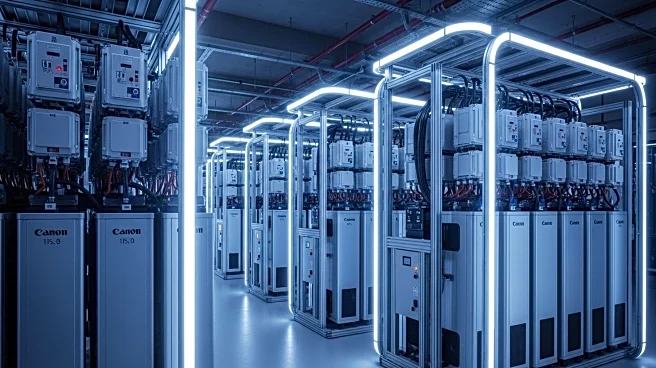What's Happening?
The PJM Interconnection, a major regional electricity grid, needs to add 43 GW of energy storage by 2045 to meet resource adequacy and clean energy goals, according to a report by the Brattle Group. The report highlights
the necessity for increased energy storage to address short-term resource needs amid delays in gas turbine projects and a projected 19% increase in peak load by 2030. PJM plans to integrate 17 GW of new gas generation by 2032 and delay thermal generator retirements to manage demand. The report emphasizes the importance of energy storage in maintaining grid reliability and suggests reforms to accelerate interconnection processes.
Why It's Important?
The need for substantial energy storage underscores the challenges faced by PJM in balancing growing energy demand with resource adequacy. As demand increases, PJM must enhance its infrastructure to prevent load shedding during extreme conditions. The reliance on energy storage is crucial for supporting renewable energy integration and ensuring grid stability. The report's findings highlight the broader implications for energy policy, including the need for regulatory reforms and investment in storage technologies. The situation reflects the evolving energy landscape and the importance of strategic planning to meet future demands.
What's Next?
PJM is working to process its interconnection queue and implement reforms to expedite project evaluations. The grid operator is exploring alternative interconnection methods to facilitate faster integration of storage and dispatchable resources. PJM's efforts to address capacity challenges will involve collaboration with stakeholders and states to encourage energy development. The success of these initiatives will depend on overcoming regulatory barriers and securing investment in energy infrastructure.
Beyond the Headlines
The focus on energy storage highlights the shift towards sustainable energy solutions and the role of technology in transforming the energy sector. The integration of storage systems is essential for supporting renewable energy sources and reducing reliance on fossil fuels. The report's emphasis on storage duration and capacity reflects the need for innovative approaches to energy management. The situation presents opportunities for technological advancements and policy reforms to enhance grid resilience and sustainability.









